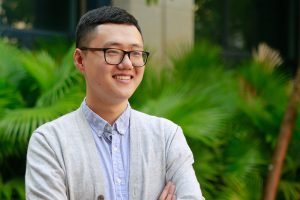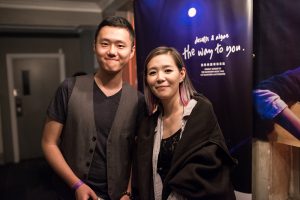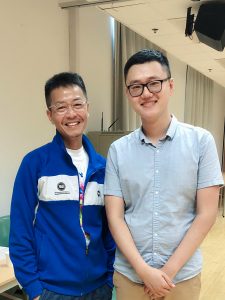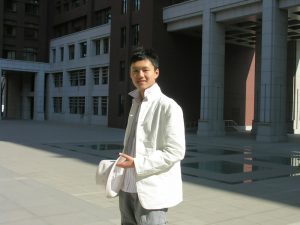Many people like pop music, but not many can become pop songwriters. Zhang Huiquan, an assistant professor in the Department of Sociology at the University of Macau (UM), began his lyricist journey by transcribing pop song lyrics and gradually developed a passion for writing lyrics himself. In addition to mainstream themes such as love, he also writes songs about social issues. Last year, he and some other songwriters in Macao wrote a theme song for the 20th anniversary of the handover of Macao, which also helped him learn more about Macao’s society.
Writing Lyrics for More Than 1,000 Songs
Prof Zhang has been a fan of pop music since junior high school, with songs by pop singers such as David Tao, Jay Chou, and Leehom Wang being his favourites. While studying sociology in his undergraduate years at Renmin University of China, he not only wrote song lyrics, but also participated in various singing competitions. Although immediately after graduation he went to the University of Toronto to pursue a doctoral degree in sociology, his passion for lyric writing did not wane. Since 2003, he has written lyrics for over 1,000 songs.
At some point, Prof Zhang began publishing his works on the internet. ‘Since I’m so passionate about creating, I should try to get more people to see my work,’ he says. In early 2016, several music producers saw his lyrics on the internet and approached him for commercial jobs. Soon, more invitations came his way. In August 2016, he released an interlude song titled ‘It’s a Good Thing You Didn’t Leave’ for the anime Spiritpact. In 2017, he wrote the theme song for the second season of the anime Under One Person. In 2018, he wrote the closing theme for the TV drama Yan Yang Chun. So far, he has written more than 50 theme songs or interlude songs for anime, films, and TV series.
As someone who grew up listening to pop music, Prof Zhang has always had one goal in mind. ‘I would like to have the opportunity to write song lyrics for Faye Wong,’ he says. ‘I just love her distinctive ethereal voice.’ Aware of his lack of professional training, he actively sought advice from industry professionals. A friend introduced him to Chow Yiu Fai, a lyricist who has worked with different Hong Kong singers, such as Anthony Wong Yiu Ming and Fiona Sit, as well as Yao Chien, a famous songwriter and music producer from Taiwan. Prof Zhang asked Chow and Yao to take a look at his works and give him some advice. ‘For people who never learned to properly write lyrics, there may be occasional geniuses who go off the beaten track, but most of these people would become mediocre because they lack systematic guidance,’ says Prof Zhang. Chowʼs encouragement remains a powerful motivation and a beacon of light for his transformation from a self-indulgent hobbyist to a professional lyricist.
Writing Lyrics about Social Phenomena
Prof Zhang says that he is inspired by a variety of things. ‘Some people may have a few thoughts after watching a film, but they are gone in a flash. If you put the idea into words, it can be expanded into a concrete work of art,’ says Prof Zhang, who has always been keen to study social phenomena and has touched on social issues in many of his works. He has published four articles in journals indexed by the Social Sciences Citation Index (SSCI) since joining UM at the end of 2019, including two on the impact of political status on well-being at different time periods in history, and two on citizen trust in government.
In addition, the epidemic has prompted Prof Zhang to contemplate social phenomena from a new perspective. ‘I was curious about the similarities between social and natural phenomena. For example, social emotions can spread like diseases. Criminals can imitate past criminal techniques, and perhaps protests can be contagious and spread,’ he says.
This alternative approach to exploring the similarities between social and natural phenomena is what he likes about sociology. His past research interests include public opinion, Chinese politics, quantitative research methods, and social movements. His academic background has given him a unique perspective on social issues and he likes to combine academia and art, using associations to incorporate social phenomena such as media chaos and wealth disparity into his lyrics.
Building Connections to Macao
Prof Zhang says that Macao has given him many inspirations. When he first came to Macao in 2019, the unique social environment and the atmosphere of the city left a deep impression on him. Later, he wrote a song titled ʻCityʼ, which depicts Macao’s dense population and high property prices: ‘We folded up the alleys / and built houses in the sky / we got trapped in golden cages / from the window to see the city lights.’
Prof Zhang describes ‘City’ as an attempt to bring together his understanding of sociology, life and love. In the song, he refers to changes in contemporary living patterns, the disconnection between people in Macao, and the increasing prevalence of electronic devices that have led to less and less face-to-face interaction. ‘We are isolated from each other and trapped in a towering cage. We are like millions of people on a subway, sitting next to each other but not knowing each other,’ says Prof Zhang.
Last year, he collaborated with Ken Sou Io Kuong, a UM alumnus who is also the president of the Macau Music Industry Association, to write lyrics for five songs on the theme of the 20th anniversary of Macao’s handover. He also wrote a love song about the Portuguese egg tart. In the future, he plans to learn more about the culture and history of Macao. He also hopes to work with and learn from other songwriters in Macao, learn to write lyrics in Cantonese, and create more songs about Macao.
Source: My UM ISSUE 99




